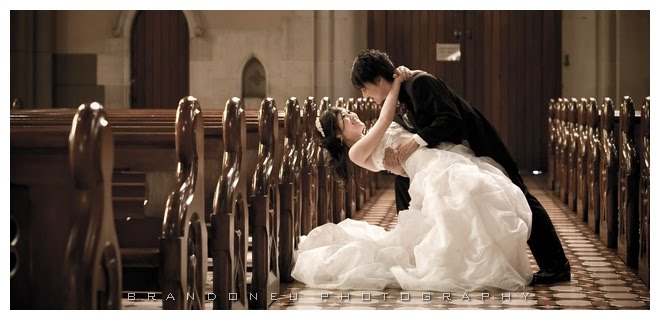I've had some experience as a freelancer shooting graduations while I was in Melbourne. It was fun, and I only had to concentrate on one family at a time, so things weren't' too tough. I'd often notice the main photographer being armed with a 70-200/2.8 lens, shooting from a distance away with some high powered battery strobes. I always complain how the photo lacked 'feel', because the flash just takes away the ambiance of the whole ceremony.
Yet in my current job, I got a taste of what it feels like to be a graduation photographer. I kid you not, we're provided high end camera bodies and lenses for the job at hand such as the 1Ds mkIII, 5D mkII, Nikon D3 and 70-200 VRII. Yes, they have very good ISO performance and have ridiculous 10fps shooting speeds, but we still use studio lights to augment existing light, hence the direct flash look and harsh shadows.
I'm basically stationed at a specific spot on the stage, be it in front or on the side. Concentration and reflexes are of the utmost importance. Every time a student receives their scroll from the Chancellor or a guest of honor, I have to press the shutter once - no more, no less. Its interesting how weary you can turn out after 2 continuous days of shooting the students from the same position over and over again. Nope, we don't shoot RAW. When we print and develop the images, jpegs are sufficient for our needs; we just need to ensure that our autofocus, exposure and compostion are acceptable when the clients receive the finished product. RAW just takes up too much space and time to process. And when you have 10,000 RAW files to process from a single convocation, thats a heck a lot of space. It's a rather thankless job too. No one will compliment how 'nice' and 'creative' your image is. We're just recording a split second moment in time to our memory cards, and then on to photo paper.
After the conferment of the degrees end, we rush off to the studio location. When the graduates start to enter with all their relatives and friends, the whole place is in chaos. We drag a chair or two and put them in front of a painted canvas of bookshelves for the family portrait. For the personal portrait, we take away the chairs, and adjust the mortar boards, how they hold the scrolls, body position, and head position. We can 'try' to be creative, but time is of the utmost importance in this case. Everyone just wants to get things over and done with. Studio lights are blasted at 1:1 ratio to eliminate as much shadows as possible.
In the last few weeks, I've learnt how it feels to be a factory line photographer. Its not the most glamourous job. A lot of it involves repetitive, manual labour, but someone has to do it to earn a living. I haven't touched my own camera in ages and just go out for some street shoots to sharpen the mind. After I get back from work, I hardly have enough energy to be creative with my photography, and I just wind down and prepare my body for a next day of hard work.
The lack of opportunity to sharpen my photographic vision worries me a little. As Kirk says,
you have to get wet if you want to learn to swim.
Cheers.

2 Comments:
Lets get wet soon. Call me up whenever you are free, in one of these weekends.
You look like you could use some Shutter therapy.
It's really good to be an amateur and not need to cari makan as a pro. Some pros have reached the position they want - they have the money, they have the fame and they have first choice of what work they want to do. The rest have to cari makan doing really mundane and less fun things. But this is not only photography - in every occupation where you earn money, you have to do the hard grind unless you are in a dominant position.
Post a Comment